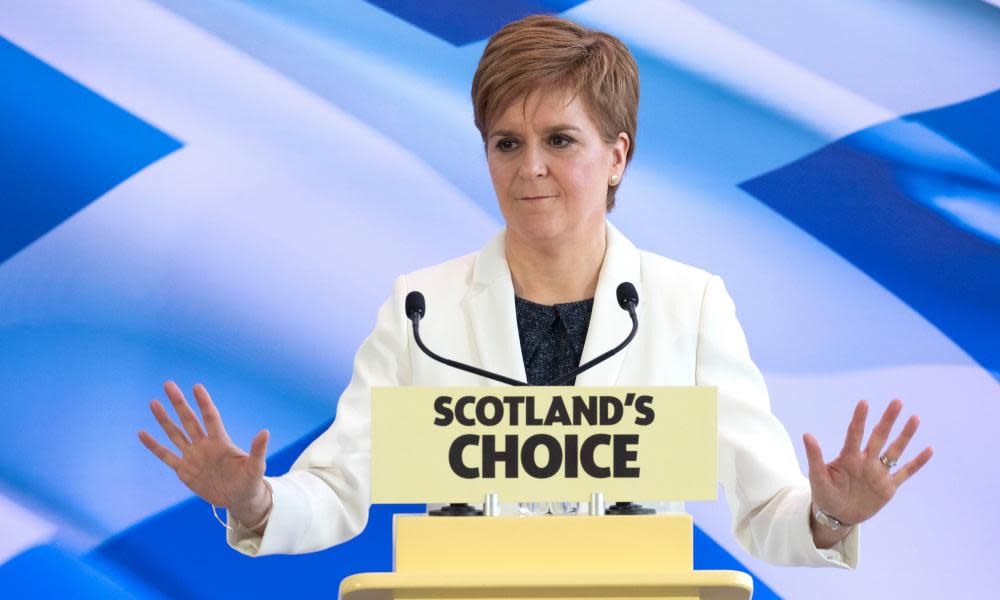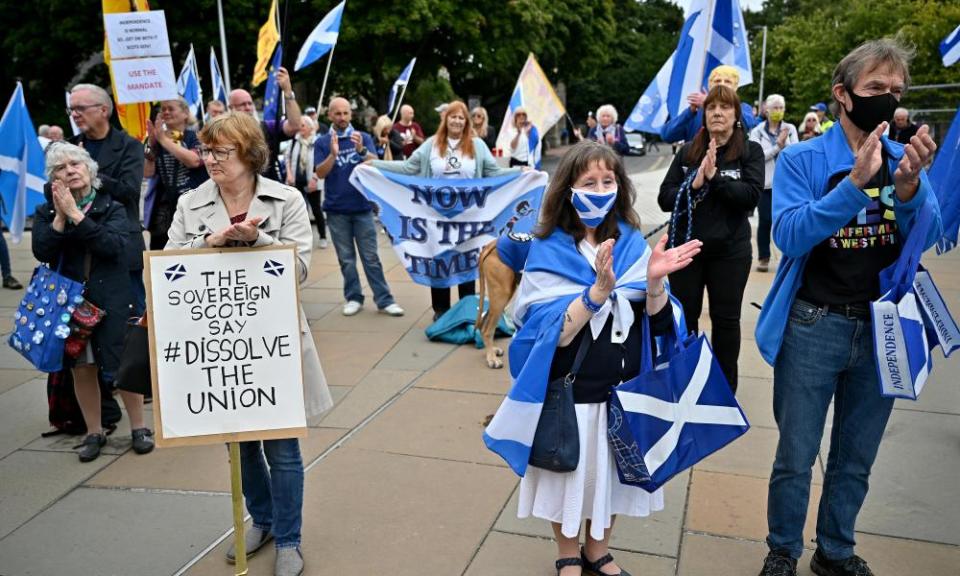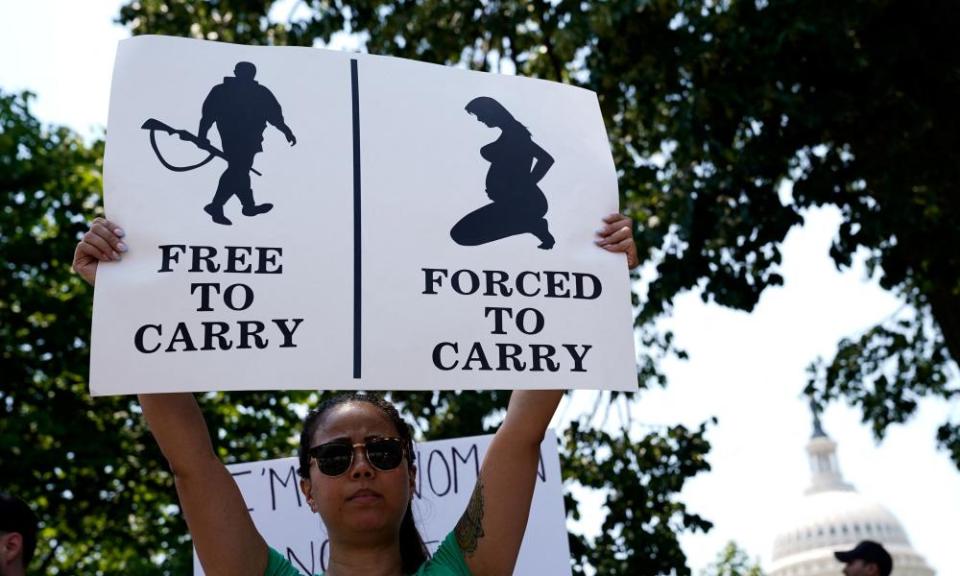Tuesday briefing: How Nicola Sturgeon aims to put Scotland on the road to independence

Good morning to all First Edition readers, except the one who messaged me to note that I look a bit blotchy in the above byline shot, and who I’m just working out whether I’m allowed to summarily unsubscribe for his cruel acuity.
Anyway. An awful lot has changed in the UK in the eight years since Scotland’s 2014 independence referendum, but one thing hasn’t: the SNP’s ambition for Scotland to go it alone. Shortly after 2pm today, Nicola Sturgeon will set out her plans for a new referendum, which she hopes to hold in October next year despite implacable opposition in Westminster.
Ahead of her speech to MSPs, Scotland’s first minister argues this morning that the UK is in no position to argue for democracy around the world if “it is intent on trying to thwart democracy at home”. Her argument is that material changes to the state of the UK since the last vote – coupled with what she sees as a mandate in Scottish elections – makes her plan legitimate. But with little chance of the UK government allowing a new referendum to be binding, many of her critics view it as a futile exercise.
So who’s right? And if a legally binding vote for independence is all but impossible, what does Sturgeon want? For today’s newsletter, I spoke to the Guardian’s Scotland editor, Severin Carrell, about the SNP’s plan, and how Westminster may respond. That’s right after the headlines.
Five big stories
Ukraine | World leaders have denounced Russia’s deadly strike on a shopping centre in Kremenchuk, Ukraine, as a war crime. 18 people are known to have been killed and 59 injured with many more casualties expected. Meanwhile, Nato said it was ready to increase its its frontline deployment from 40,000 to 300,000.
Northern Ireland | Proposed legislation to allow the UK to unilaterally rip up Brexit arrangements for Northern Ireland passed its first hurdle in the House of Commons on Monday night. MPs voting 295 to 221 in favour despite heavy criticism from Tory backbenchers including former prime minister Theresa May.
US news | Forty-six people have been found dead inside a truck on a remote back road in Texas in an incident described as a “horrific human tragedy”. The victims are believed to have been attempting to cross the US border from Mexico on a major transit route for people smugglers.
NHS | Doctors have called for a pay rise of up to 30% over the next five years, a move that increases the chances of strike action. The British Medical Association said the real value of take-home pay had fallen by almost a third since 2008.
Monarchy | A Scottish government memo obtained by the Guardian reveals that “it is almost certain” draft laws have been secretly changed to secure the monarch’s approval under an arcane mechanism known as Queen’s consent.
In depth: What to know about the ‘road map’ to a second vote

***
What is Nicola Sturgeon doing today?
After launching a new campaign for independence earlier this month, Scotland’s first minister Nicola Sturgeon will today provide crucial details of how she wants to go about it. In an address to the Scottish parliament, she will set out a road map for a new referendum by the end of next year.
Sturgeon will tell MSPs how she intends to secure a meaningful referendum when the British government has insisted that it would oppose any such move – and with most experts agreeing that without Westminster’s agreement a legally binding vote is not possible.
There are two broad paths available to Sturgeon: seek to force a binding referendum despite that Westminster opposition, or propose an alternative question without the same legal force but which she is more likely to be able to push through.
With parliament about to go into recess for the summer, whatever path she chooses will take some time to put into motion. “What’s happening on Tuesday is not the start of a constitutional process,” said Severin. “It’s the start of a political campaign.”
***
Can the Scottish government force a binding referendum?
Most legal experts think it’s unlikely, and Severin says that realistic supporters of independence will probably take the same view. The 2014 referendum was granted on the basis of something called a section 30 order, by which Westminster temporarily gave Holyrood the power to pass a law allowing an independence referendum. That came about after Alex Salmond led the SNP to its first majority in the Scottish parliament, a vote widely interpreted as a mandate for an independence vote.
While Sturgeon will argue that a pro-independence majority at Holyrood in changed circumstances renews that mandate, Boris Johnson’s government insists that the last referendum settled the matter.
Sturgeon may nonetheless say that the Scottish government will apply for a new section 30 order, maybe with a question worded as a draft independence bill recently suggested: “Should Scotland be an independent country?” Last Sunday, the SNP’s constitution secretary Angus Robertson suggested that such a vote would be the Scottish government’s “preferred route”. If the UK refuses the application, one possibility is a joint application to the supreme court to settle the matter.
The Westminster government is unlikely to go along with that. Even if it does, Dr David Torrance, a constitutional specialist at the House of Commons library, says that the court is not likely to see a referendum as something that the Scottish government has the power to force on its own.
***
How might another approach work?
If Sturgeon decides that seeking a legally binding referendum is pointless, she may settle on another approach: a carefully worded “consultative” referendum. Ciaran Martin, the former constitution director for the UK government who worked on the framework for the last referendum, suggested (£) recently that this kind of “legal wheeze” is more likely than a full-fat vote. He said the question might be framed as, for example, asking “the people of Scotland for a mandate to open negotiations with the UK”.
Severin views that approach as primarily an “act of political theatre”. “It’s about trying to force the pace,” he said. “It gives the yes campaign a sense of momentum and a sense of purpose.”
Even a non-binding referendum could be derailed if the Holyrood parliament’s presiding officer ruling it “ultra vires”, or outside the devolved government’s powers. “If that happens but they proceed anyway, that’s a very strong basis for a legal challenge,” Severin said.
***
Does Sturgeon have a mandate?
Mandates are quite amorphous things, and whether or not you think a government has one is quite likely to depend on whether or not you like the thing they’re trying to do. For example, while the SNP and independence-backing Greens have a majority of seats in the Scottish parliament, they still came behind pro-union parties in the popular vote.
In June, a paper published by the Scottish Election Study argued that “As there is no objective, independent benchmark on which to base claims of a mandate, we can turn to what the public thinks”. It found that however you frame the question, clear majorities in Scotland think that Sturgeon does have a mandate.
But while that’s good news for the SNP, it’s not exactly the same thing as support for independence itself: it’s perfectly coherent to think it’s right for the question to be posed, but that your answer might be no. (Polls show support for independence persistently in the high 40s – high enough to scare pro-union parties, but no guarantee of success for the SNP.)
Some have pointed out that although support for independence rose in the last campaign, there may be significantly greater circumstantial hurdles this time. “You have a war in Europe, rocketing energy prices, a cost of living crisis,” Severin said. While Brexit has strengthened the emotional and democratic arguments for independence, it may have weakened the economic case: “It’s shown that increasing the obstacles to free trade has a direct economic impact.”
On the other hand, you have … Boris Johnson. “He has become a recruiting sergeant for independence,” said Severin. “The SNP has been trying to capitalise on people’s antipathy for Johnson in Scotland ever since he won power.”
***
If a referendum is unlikely to bring independence, what’s the point?
All of this suggests that – while certainly not impossible – the path that Sturgeon is embarking on today is unlikely to lead to a binding vote for independence next year. But there are hard-headed political reasons to be making the case for a referendum all the same.
One view is that if Labour wins the next election, the momentum behind independence is likely to dissipate somewhat, so it’s better to strike now. Perhaps more importantly, Severin argues, “it will shore the SNP up ahead of the next UK general election. Even if the economics are harder than they were a decade ago, it is helpful for them to argue that Scotland’s hopes of independence are being thwarted in Westminster.”
For a sense of how powerful a force independence is even in its absence, you only need to look at the SNP’s longstanding dominance in Scotland despite its inability to achieve its ultimate aim – so far, at least. “The history of the last 15 years is that the SNP very rarely loses in these situations,” Severin said. “It rarely gets everything it wants, but it gains something else.”
What else we’ve been reading
The risk of maternal mortality is already higher for Black women in the United States. Tayo Bero lays out the disastrous ramifications for Black women who have unwanted pregnancies, following the US supreme court’s decision to overturn Roe v Wade. Nimo
If you share my assumption that the theory of evolution is long settled, prepare to have your mind blown by Stephen Buranyi’s superb account of a battle over “the fate of one of the grand theories that shaped the modern age”. Features land-dwelling fish. Archie
For the Guardian’s Made in Britain series, activist Kwajo Tweneboa explores the crisis in social housing in London. Tweneboa talks to tenants left in atrocious conditions, reflecting on his own experience of this same system. Nimo
As more and more workers move towards strikes, Boris Johnson has called for wage restraint. Cary Roberts of the IPPR sets out research from her thinktank showing corporate profits have not been similarly restrained, arguing that this mismatch is “not only deeply unjust - it’s also not good economics.” Archie
Lizzie Cernik spoke to Ruth and David, a couple who’ve been married since 1994, about how they met. After calling it off after just two dates, a series of events made Ruth realise that she and David were meant to be: “it was fate – or, as we say in the Jewish tradition, bashert.” Nimo
Sport
Tennis | Emma Raducanu put her troubled build-up behind her as she marked her Centre Court debut by defeating Alison Van Uytvanck in straight sets to reach the second round of Wimbledon. Later, Andy Murray beat James Duckworth in four sets.
Cricket | Jonny Bairstow and Joe Root completed England’s third remarkable run chase in a row to kick off the Brendon McCullum era with a series whitewash over New Zealand at Headingley.
Cricket | An in-house diversity group at the BBC has criticised as “totally inexcusable” the decision to employ the former England cricket captain Michael Vaughan as part of the Radio 5 live commentary team. Vaughan has been accused by several players of making a racist comment before a Yorkshire game in 2009. He denies the claim.
The front pages
The Ukraine war dominates front pages including the devastating Russian missile attack on a shopping centre in Kremenchuk. The i newspaper leads with “Murder at the shops” and the Express says “Crime against humanity”. The Times splashes with “Putin will pay for his barbarity, PM insists” while the Telegraph has “Army chief: Ukraine is our ‘1937 moment’”. The FT says “Nato buttresses eastern flank by increasing forces to 300,000”.
The Guardian leads with “Prospect of strike grows as doctors eye 30% pay deal” and the Mail has “Doctors demand 30% pay increase”. The Mirror interviews the mother of Helen McCourt, who was murdered in 1988, for its lead: “Helen’s killer takes secrets to the grave.”
Today in Focus

The women’s lives in danger in a post-Roe America
Jessica Glenza reports on the supreme court ruling and the profound consequences it will have for women facing unwanted pregnancies across the United States.
Cartoon of the day | Martin Rowson
The Upside
A bit of good news to remind you that the world’s not all bad
The Lotus Sports Club in Cambodia is more than just an under-21s football club: it’s also a lifeline for young queer Cambodians. Under the tutelage of transgender coach Van “Pa Vann” Sovann, the club has become a place where queer teenagers from across the country flock to in search of acceptance and community. The team practices three times a week, and even though they have experienced discrimination from other teams they are still a formidable force, both on and off the field.
Sign up here for a weekly roundup of The Upside, sent to you every Sunday
Bored at work?
And finally, the Guardian’s crosswords to keep you entertained throughout the day – with plenty more on the Guardian’s Puzzles app for iOS and Android. Until tomorrow.

 Yahoo Movies
Yahoo Movies 
